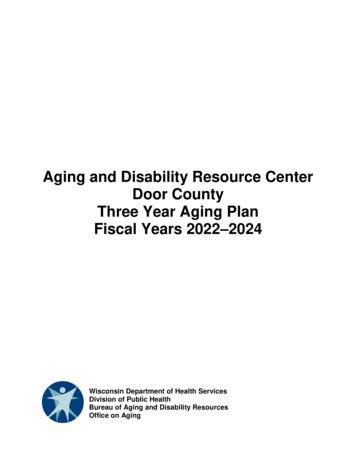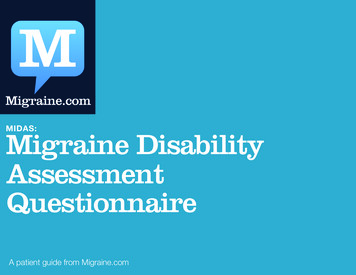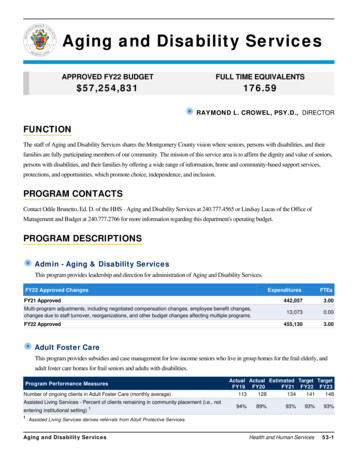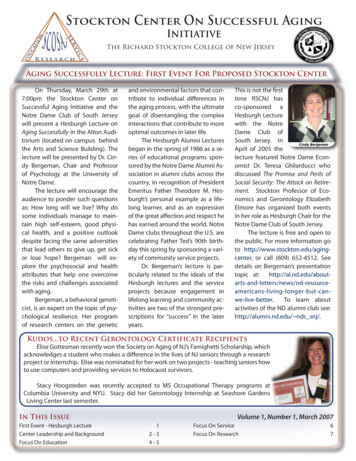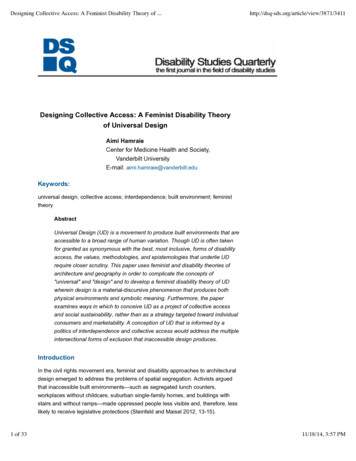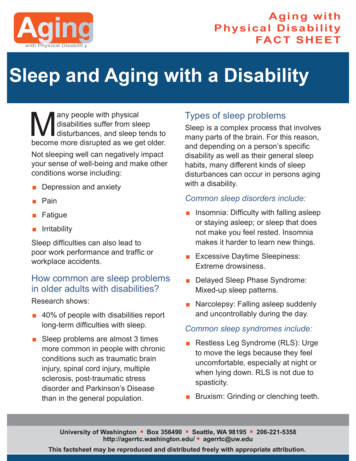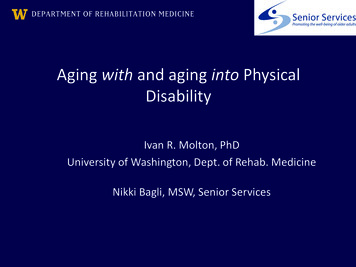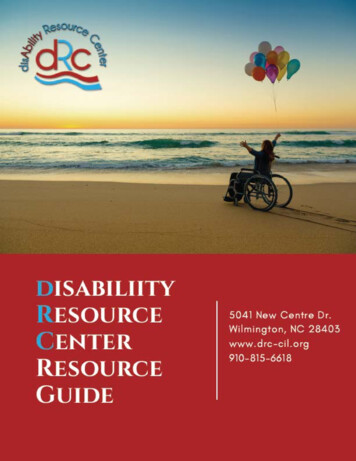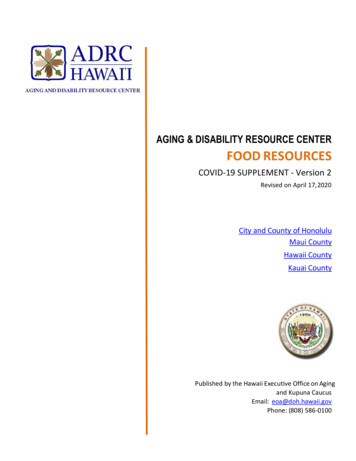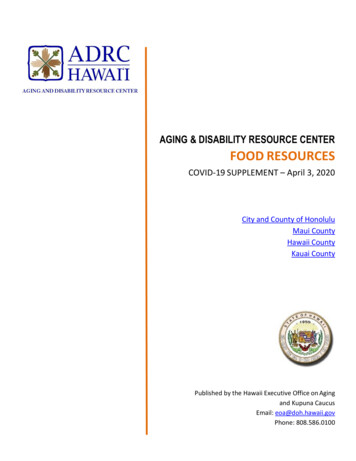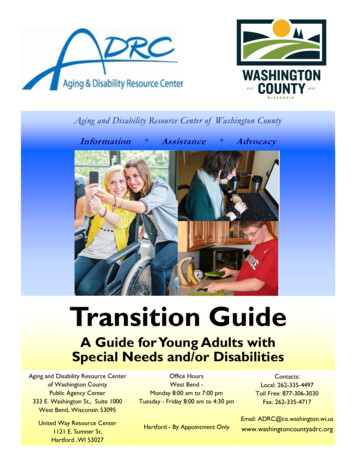
Transcription
Aging and Disability Resource Center of Washington CountyInformation*Assistance*AdvocacyTransition GuideA Guide for Young Adults withSpecial Needs and/or DisabilitiesAging and Disability Resource Centerof Washington CountyPublic Agency Center333 E. Washington St., Suite 1000West Bend, Wisconsin 53095United Way Resource Center1121 E. Sumner St.Hartford ,WI 53027Office HoursWest Bend Monday 8:00 am to 7:00 pmTuesday - Friday 8:00 am to 4:30 pmContacts:Local: 262-335-4497Toll Free: 877-306-3030Fax: 262-335-4717Email: ADRC@co.washington.wi.usHartford - By Appointment Onlywww.washingtoncountyadrc.org
Your one stop shop for Resources,Information, and Assistance.Congratulations!!TRANSITION IS A PROCESSQuestions you will need toconsider:Your 18 th Birthday marks an important milestone leaving childhood behind and entering life as an adult. How do youth services andadult services differ?Many changes in disability services occur when a What is publicly funded longstudent is between the age of 18 and 21.term care and how is eligibilitydetermined?This publication was developed by the ADRC of How do my legal rights andWaukesha County, with the assistance of the Waukesharesponsibilities change?County Department of Health and Human Services How does guardianship change?Children's Special Needs Unit and parents of youth who How will I support myself andmanage my finances?have experienced transition or who will be in transition How will I manage my healthin the near future. Information was edited to reflectcare?Washington County’s information. Where and how will I live? Will I go to school, or jobIt is intended to help the student with disabilities andtraining for employment?his/her family make the transition into adulthood as Where can I find help andsmoothly and effectively as possible. It provides a briefguidance to answer all thesequestions?overview of the changes, the process, the timeline andthe resources involved for a young person with specialneeds and/or disabilities to transition from adolescenceinto adulthood.It explains how and when the ADRC can help youunderstand your new rights and responsibilities,determine your immediate and future care needs andevaluate your options for meeting those needs. Itprovides links to resources and organizations that willhelp you make more informed choices about living as anadult in Washington County.thBeginning 6 months before your 18 birthday, theADRC can help you, your family and your transitionteam make the transition process seamless, productive,and less stressful. We can help you identify thequestions to ask and find answers specifically tailoredto your situation.The ADRC can help you findanswers to your questions.To learn more about theADRC, request an ADRCBrochure by calling 262-3354497 or go towww.washingtoncountyadrc.orgThere is no charge for ADRCServices.Volume 8.192
How do Youth Services and Adult Services Differ?High School/Entitlement Eligibility/Adult Service Systems Special Education Services are free.Services based on the Individualized Education Plan (IEP) initiated by the school district.Progress toward IEP goal is monitored and communicated to parents and students.Required by the Individuals with Disabilities Educa tion Act (IDEA). Adult services are based on eligibility and varyby agency.Services are based on the Individualized ServicePlan (ISP) and/or Individualized Plan for Employment (IPE) which are developed with theadult consumer.Progress toward goals is monitored by consumerand requires self advocacy.Required by Section 504 of the RehabilitationAct and the Americans with Disabilities Act.(ADA).THE ADRC CAN BEGIN ASSISTING YOUWITH YOUR TRANSITIONBefore 17 years 6 months of age:Contact Compass Wisconsin: Threshold at 414-266-6151,toll free at 800-234-5437 or 920-470-0726 (Washington andOzaukee Counties). The Compass Wisconsin website is:www.compasswisconsin.org. This is the doorway to applyfor Children's Long Term Services, Family Support Program,Katie Beckett, and other services. Obtain and keep a copy of school records, including IEP’s, psychological evaluations, and Occupational/Physical/Speech Therapy evaluations. All thesedocuments will assist in determining eligibility forprograms. Start thinking and talking about transition from pediatric to adult health care service.At age 17 years 6 months of age:If you are not involved with the Washington County Children and Families Unit contact the ADRC as they canhelp you and your family review and understand all your long-term care options-in light of your particularneeds and situation. They can help you . Consider your options for transitioning from pediatric to adult health care services. Consider your interests and preferences in thinking about post high school work or education possibilities. Learn about community, services, organizations, and housing options. Consider legal issues such as Guardianship, Power of Attorney, Power of Financial Attorney, advance directive options, and estate planning issues. Learn about your new rights and responsibilities. Provide links to helpful information, resources, and organizations.By age 21This is the last year you are entitled to Special Education Services through the public schools, if you did notgraduate. Transition to adult health care providers should be complete. Living situation and employment should be secured.3
What is Publicly Funded Long-Term Care?Publicly Funded Long Term Care Programs provide a wide range of long term support services to eligiblemembers. Potential members are adults over the age of 18 with physical or intellectual disabilities andelders with long term conditions requiring care. You must be functionally and financially eligible in order toenroll in Publicly Funded Long Term Care Programs.The Aging and Disability Resource Center (ADRC) staff will assess the potential member’s eligibility forthese programs. When you reach age 17 years 6 months you should contact the ADRC for information, assistance and advice about available services, and possible eligibility.When you wish to enroll in a Publicly Funded Long Term Care Program, you will meet with an Information and Assistance Specialist who will assist you with options counseling for you to be able to make aninformed decision on to which program would be able to meet your needs. Depending on eligibility,enrollment counseling may be provided as well.There are two assessments to determine eligibility:A Long Term Care Functional Screen which gather s infor mation about whether the individual needshelp and how much help they need to perform activities of everyday life– for example, walking bathing, eating, and managing medication. (It is very important for you to obtain and keep a copy of school records including IEP’s psychological evaluations, and OT/PT/Speech evaluations. All of these documents will assistin determining eligibility for programs.)A Financial Assessment which is based on your income and assets. A consumer would need to meetMedicaid eligibility requirements. Publicly Funded Long Term Care Programs help provide the services thatyou need live an active, healthy, and independent life. This is done by offering a variety of community basedsupports, which are identified to help you achieve your goals in the most cost effective manner possible. Depending on your financial situation, you may have a cost share for services. You will be told how much thiswill be before enrollment.Public funding supports may include, but are not limited to: Adaptive Aids Assisted Living Financial Management Respite Care Medical Equipment Prevocational Training Skilled Nursing Services Supported Employment Supportive Home Care Personal Response System Home Delivered MealsAt this time, an adult who meets both functional and financial eligibility requirements will have enrollmentcounseling with an Information and Assistance Specialist.4
Considering Your Options for Publicly Funded Long-Term CarePaying for Long Term CareMany different sources can help pay for long term care. These may include private insurance, retirementbenefits, personal savings and government assistance programs like Medicaid, Medicare and Veteran'sBenefits Administration. It is important to understand what services and types of care each one covers.Choosing a long-term care program that meets your particular needs and situation can be difficult andconfusing. The ADRC can help you understand and compare all your long-term care options.Family CareCommunity Care910 E Paradise DriveWest Bend, Wisconsin 53095262-346-0900www.communitycareinc.orgCare Wisconsin First, Inc.2364 W Washington Street, Unit BWest Bend, WI 530951-866-293-0608www.carewisc.orgInclusa, Inc.3349 Church Street, Suite 1Stevens Point, WI 54481715-345-5968Toll Free 1-877-622-6700www.inclusa.orgMy Choice Family Care10201 West Innovation Drive, Suite 100Wauwatosa, WI mily Care PartnershipCare Wisconsin First, Inc.2364 W Washington Street, Unit BWest Bend, WI 530951-866-293-0608www.carewisc.orgCommunity Care910 E Paradise DriveWest Bend, Wisconsin 53095Community Care: ndex.htm5
IRISIRIS – Include, Respect, I Self-Direct is Wisconsin’s Self-Directed Supports Program forelders and adults with disabilities.In IRIS, you determine the combination of supports and services you need, including who willprovidethe services and when and how they will be provided. The IRIS team is available at every stepto help you build the life you want with the support you need!Visit the website at: www.dhs.wisconsin.gov/ir is/index.htm1-888-515-IRIS (4747)IRIS Consultant Agency OptionsIRIS consultant agencies provide flexible and specialized support that is responsive to aparticipant’s needs and preferences for long term care services.The IRIS consultant agencies’ roles and responsibilities focus on supporting the participant inself-direction, which includes enrollment, service planning and continued eligibility.Advocates4U11051 N. Towne Square RoadMequon, WI 53092877-739-2203irisadvocates4u.orgConnections, Lutheran Social Services6737 W. Washington Street, Suite 2275West Allis, WI gFirst Person Care Consultants6100 N. Baker Road, Suite 100AGlendale, WI 53209414-336-2448www.firstpersoncare.comTMG1 South Pinkney Street, Suite 320Madison, WI 53703844-864-8987www.tmgwisconsin.com6
Long Term Care State Agencies and OmbudsmanState Licensure/Complaints:Division of Quality AssuranceP.O. Box 2969Madison, WI ponsible for monitoring different types of health and community care providers, includingNursing Homes, Hospitals, and Home Health Agencies. Also does on-site surveys, complaintinvestigations, and enforcement. The Northeastern Regional office represents WashingtonCounty.State Bureau of Aging and Disability Resources:Bureau of Aging and Disability Resources1 W Wilson St., Room 551, Madison, WI mResponsible for implementing Title III of the Older Americans Act, oversees a county agingnetwork and promotes public policies to help older people.DRW Ombudsman ServicesDisability Rights Wisconsin131 W Wilson St., Suite 700, Madison, WI 53703608-267-0214 Toll Free: 800-928-8778www.disabilityrightswi.orgDesignated protection and advocacy agency for people (18-59 years of age) withintellectual disabilities and mental illness. Disability Rights helps people across Wisconsingain access to services and opportunity through its advocacy and legal expertise.7
How Do My Legal Rights & Responsibilities Change?When a student turns 18, parents no longer automatically have legal responsibility over their child’s medical orfinancial affairs—regardless of the nature or severity of their disability.The booklet “What you should know about Wisconsin Law; Your legal rights and responsibilities” isavailable at the ADRC. It was designed to focus on changes and legal rights andresponsibilities that occur when an individual becomes 18 years of age.What are some of the rights and responsibilities a student has after age 18 that theydidn't have before?As a legal adult: An individual has the right to vote, and he/she may also be chosen to serve for juryduty. An individual has the right to sign a contract such as renting an apartment,taking out a loan or buying a vehicle, but if the contract is not fulfilled, he/she maybe sued. An individual has the right to be completely independent from parental control, ashis/her parents are no longer legally responsible to provide his/her support, and areno longer legally authorized to make decisions on his/her behalf.For more detailed informationcall the ADRC to request a copy.Guardianship What Is It and Who Needs It?A guardianship of the person is appropriate when an individual is unable to receive and evaluate informationor make or communicate decisions to such an extent that he/she is unable to meet the essential requirementsfor his/her physical health and safety. When this appears to be the situation, a court may be asked to find thatthe individual is incompetent and appoint a guardian to make decision on the individual’s behalf. A judgemakes a legal determination that the person placed under guardianship is incompetent and unable to make his/her own decisions. Physical disability and/or poor judgment without a legal finding of incompetence are notsufficient reasons to establish a guardianship.There are two basic kinds of guardianship:Guardian of the Estate—Manages the ward’s finances and property.Guardian of the Person—Manages personal needs such as food, shelter, socialservices, or medical needs.A court may appoint the same person for both kinds of guardianship or theresponsibilities may be divided.Upon the filing of a petition, the court will appoint a guardian ad litem. This is anattorney who will investigate the facts and circumstances alleged in the petition andadvise the court as to what is in the individual’s best interests. The guardianFor more detailed informationad litem does not represent the individual or the petitioner.call the ADRC to request a copy.The booklet “Understanding Guardianships: A Handbook for Guardians” explains in more detail the guardianship process and responsibilities of a guardian. Any guardian is expected to make decisions based on what isin the individual’s best interest. For online information visit the Wisconsin Guardianship Support Center atwww.gwaar.org or call 855-409-9410.8
Decision Making OptionsWhat is an Advance Directive? An advance dir ective is a legal document that allows you to give instr uctions for a broad range of health care decisions and appoint an agent to make those decisions for you if youbecome unable or unwilling to do so yourself. It is any written communication from you, properly signed andwitnessed, that speaks about your future wishes and preferences for treatment. Because advance directives express your values, they provide the best possible guidance to those who will make decisions about your carewhen needed. Completing an advance directive also allows you to designate a healthcare agent, a person ofyour choosing who can make decisions for you in the event that you are no longer able to speak for yourself.What is Guardianship? A legal guardian is a per son or or ganization appointed by a cour t to ser ve as asubstitute decision maker for a person called a ward who, because of an impairment, is found by the court tobe incompetent. The court may give the guardian authority to make personal decisions for the ward, includingproviding informed consent for health care and medication, deciding where the ward will live, and decidingwho will provide social and supportive services for the ward. This type of guardian is a “guardian of the person.” The court also can give the guardian authority to manage the wards’ money and other property. Thistype of guardian is “guardian of the estate.”What is Supported Decision Making? A supported decision-making agreement is another legal tool forpeople with disabilities and older adults to use besides guardianship. It will allow people with disabilities andolder adults to formally designate others they want supporting them and gives the supporter a seat at the tablewhen decisions are being made, allowing the individual to consult with their supporter when they need it. Wisconsin is only the fourth state in the nation to create such a statute, making Wisconsin a leader in this area anda model for other states and territories.What is a Power of Attorney for Finances and Property? A Power of Attor ney for Finances and Pr operty is a document that you (the "principal") complete and sign, naming another individual (the "agent" or"attorney-in-fact") to manage your finances. You determine the money and property you want the agent tohave authority over, as well as the authority you want the agent to have. The authority can be broad or specific,depending on your preference. Your Power of Attorney for Finances and Property may be created using thestate form version, the "Wisconsin Statutory Form Power ofAttorney for Finances and Property" ("state form"), or you may consult an attorney for a Power of Attorney forFinances and Property customized to fit your particular needs.What is a Power of Attorney for Health Care? A power of attor ney for health car e (POA-HC) is a document that you (the “principal”) complete and sign, naming another individual (the “agent”) to make yourhealth care decisions for you if you ever become unable to make those decisions for yourself. A POA-HC is away for you to plan ahead to authorize someone else (the “agent”) to make your health care decisions if youever become temporarily or permanently unable to do so yourself. Completing a POA-HC allows you tochoose the individual you want to make these decisions and to discuss with her or him what you want thosedecisions to be.The information contained above does not constitute legal advice. It is meant to inform you of available options. For more detailed information, we recommend visiting the following websites:Guardianship Support Center – www.gwaar.orgDisability Rights Wisconsin – www.disabilityrightswi.orgThe Waisman Center – www.waisman.wisc.edu/Family Voices – www.familyvoicesofwisconsin.comState Bar of Wisconsin – www.wisbar.orgBPDD – Wisconsin Board for People with Developmental Disabilitieswww.wi-bpdd.org9
How Will I Support Myself?Social Security Administration ProgramsSocial Security programs provide financial protection to workersand their families, and pay monthly Social Security retirement,disability, or survivor benefits to individuals. The SupplementalSecurity Income (SSI) program pays monthly benefits toindividuals who have little or no resources and who are aged, blind,or disabled. The Social Security Administration administers bothprograms. Most young disabled adults receive SSI unless a parentis deceased or retired.If you received SSI prior to age 18, contact Social Security to see ifyou will need to complete a review. Eligibility must be reestablished at age 18. To prevent interruption of benefits, contact theSocial Security office 3 months before your 18th birthday. Thelocal office servicing Washington County residents is located inWest Bend at 1-888-655-0843. You can call and make an appointment to apply for SSI. When you make your appointment you maywant to discuss what documents you will need to bring.Social Security1145 Vern StreetWest Bend, WI 530901-888-655-0843National # 1-800-772-1213If you begin working and are receiving SSI, your cash benefit willchange based upon how much you earn each month. Generally, themore income you have the less you will receive from your SSI cashbenefit. There are several work incentive programs available toassist you in keeping some SSI cash benefits which you can discusswith Social Security representatives. Some application forms may be filled out online at: www.ssa.govDisability Benefit Specialist ProgramThe Disability Benefit Specialist program is a service of the Aging andDisability Resource Center. The Disability Benefit Specialist (DBS) worksclosely with Information and Assistance Specialists on options and otherResource Center services. The DBS provides services to people ages 18 to 59with physical disabilities, intellectual disabilities, mental illness, andsubstance use disorders. The DBS provides information about publicand private benefit programs including assistance with application and appealprocedures, such as formal appeals related to denials of eligibility, terminationof benefits or overpayments of public and private benefits.The Disability Benefit Specialist can help you with: Medicaid (MedicalAssistance) * Food Share * Medicare, Including Part D *Veteran's Benefits *Social Security Disability Income * Supplemental Security Income (SSI) *Housing and Utility Issues * Prescription Drug Assistance Programs * PrivateHealth and Disability Insurance Issues *10Aging and DisabilityResource Center (ADRC)of Washington CountyDISABILITYBENEFITSPECIALISTPROGRAM
How Will I Manage My Health Care?Preparing and planning for transition is about futureeducation, work plans, living arrangements, and finances. It isalso about how to manage a health condition or disability asindependently as possible.The Health Pocket Guide can be picked up from the ADRC orordered online. You can use it to keep track of your healthcare information and have a written record of your medicines,allergies, what others should do in case of an emergency andmore.Some other suggestions to assist you with transition:My Health Pocket GuideAvailable through the ADRC orOnline atwww.waisman.wisc.edu/wrc/pub.html*Begin updating your evaluations and assessments. Obtainand keep a copy of school records, including IEPs,psychological evaluations and OT/PT/Speech evaluations.All of these documents will assist in determining eligibilityfor programs.*Start thinking and talking about transition from pediatric toadult health care service providers.Transitioning from pediatrics to health care providers for adultscan feel like a completely new territory. It may take some timefor your new health care providers to get to know you. Theywill look to you to help them. Hospitals and doctors’ officesmay look and feel different.Trying to find a new adult healthcare provider may take someexploring. Find a new health care provider that specializes inadults. When you were younger, your parents probably didmost of the talking during your doctor visits. As a teen, thisresponsibility will fall more to you. Are you comfortable talking with your doctor? What kinds of questions should you ask?What does it mean to be your own advocate? It means you askfor what you need while being respectful of others. Understandyour needs and wants and be able to express them to others.Know your strengths and weaknesses. Be confident, believe inyourself, and be your own person, but remember to ask for helpwhen needed!Thinking about what you want from a doctor, making sure yourinsurance will pay for appointments, and being persistent andflexible will help find the right one for you. Learn the basicsabout health insurance. Lets' face it.insurance can be confusing to just about anyone! Knowing how your current insuranceworks can be useful for when you need find new insurance inthe future.This booklet “Transition Health Care Checklist: Preparing forLife as an Adult” is a resource to help you and your familymake a successful transition to adult living.11Transition Health Care Checklist:Preparing for Life as an AdultAvailable through the ADRC or online atwww.waisman.wisc.edu/wrc/pub.html
How Much Assistance Will You Need?Regardless of where you live as an adult, you will need to develop skills tobe as independent as possible in your daily life. Knowing what you willneed and where you can find it will be essential to a successful transitioninto adulthood. The ADRC can connect you to information, resources andOrganizations to make your transition less stressful and more effective.Contact the ADRC for the most updated list of service providers in yourarea.Aging and DisabilityResource Center (ADRC)of Washington CountyADRCResource GuideA resource guide for olderadults, adults with physical orintellectual disabilities, adultswith mental health or substanceuse concerns.Public Agency Center333 E. Washington StreetSuite 1000West Bend, WI 53095Supportive services may include:Homemaker / Supportive Home CareHomemaker and HCA agencies employ homemakers or chore workers.HCAs are companions who support individuals through meal preparation,bathing, dressing and housekeeping. Personnel are assigned according tothe needs and wishes of the client. Most homemaker and HCA agenciesrecruit, train and supervise their personnel and thus are responsible for thecare rendered.Adult Day CareAn Adult Day Care facility provides services for part of a day in a groupsetting to adults who needassistance with activities of daily living (ADLs), supervision and/or protection. Services may includepersonal care and supervision, provision of meals, medical care, medication administration, transportationand activities designed to meet physical, social and leisure time needs. In Wisconsin, adult day carecenters are not licensed, but may be certified. If a center is certified, the DHS conducts surveys todetermine compliance with certification standards.Respite CareRespite services are intended to relieve care providers who are responsible for the ongoing care of anotherperson. It is essential for care providers to have regular time off periods to attend to business, enjoy timeaway, rest and recharge. Overburdened care providers are at risk of becoming isolated from socialcontacts, or even physically ill. The person receiving respite care is provided an opportunity to socializewith others, while still receiving the care they require. Respite services may sometimes involve overnightcare for an extended period of time.Durable Medical EquipmentDurable medical equipment (DME) is equipment that is used primarily for medical purposes at home, isnecessary for the treatment of an illness or disease and is designed to withstand prolonged use.Washington County ADRC on the Webwww.washingtoncountyadrc.orgThis website is designed to help you find the information you need to access community resources andservices for older people, adults with disabilities and their families and caregivers, regardless of income.ADRC More InformationIf you’re not sure what to look for, or have any questions, please don’t hesitate to contact the Aging & Disability Resource Center of Washington County at 262-335-4497. We are available to help you think throughyour concerns, explore and weigh options from information specifically tailored to your situation.12
Where Will You Live?As an adult, you (and your family or guardian, if one is appointed) will be responsible for determining howyou live your life. You will make many decisions, which will affect the quality and stability of your life as anadult. You may choose to live with your family into adulthood, or you may want to experience independentliving. Maybe you will go back and forth between your family and independent living. There are many thingsto consider in making this very important choice.The ADRC can help you sort them all out.Housing and Assisted Living OptionsSupportive Services in the HomeIndividual continues to live at home (own home or family member’shome) and receives supportive services.Supervised/Supported ApartmentsOn-site staff supervision and support services available from a fewhours to 24-hours a day—may include personal care assistance, makingmeals, assistance in budgeting, help with connecting to communityleisure activities or other areas needing attention.Adult Family (1-4 beds) HomesA place where adults who are not related to the operator reside andreceive care, treatment, or services that are above the level of room andboard, and may include up to 7-hours per week of nursing care perresident.Community Based ResidentialFacility (CBRF) (more than 5 beds)A place where five or more unrelated people live together in acommunity setting. Services provided include room and board,supervision, support services and may include up to 3-hours of nursingper week.Assisted Living Options in Washington CountyDo you have questions about Assisted Living?What assisted living options are available in Washington County?How do I choose the option best suited to meet my needs?What does it cost and how do I know what I can afford to pay?Where can I get information about assisted living and help to understandmy options?Find answers to these questions and more!ADRC Resource GuideAvailable on the web or from the ADRC of Washington Countywww.washingtoncountyadrc.org or call us at 262-335-449713Aging and DisabilityResource Center (ADRC)of Washington CountyADRCResource GuideA resource guide for olderadults, adults with physical orintellectual disabilities, adultswith mental health or substanceuse concerns.Public Agency Center333 E. Washington Street,Suite 1000West Bend, WI 53095
What is a Vocational Evaluation?A vocational evaluation is a process during which participants try out work tasks and take tests to learn abouttheir vocational strengths, weakness and interests. Participants receive career counseling on realistic job goalsand determine steps to achieve these goals. This should be part of your transition goals in your IEP. Checkwith your IEP team. Participants leave the evaluation with a better understandingof what they are capable of, usually as a result of trying activities related to jobsthat interest them. Comprehensive recommendations include employmentoptions developed in collaboration with the participant and services necessary toachieve vocational goals. Ex
Email: ADRC@co.washington.wi.us Hartford - By Appointment Only Aging and Disability Resource Center of Washington County Public Agency Center 333 E. Washington St., Suite 1000 West Bend, Wisconsin 53095 United Way Resource Center 1121 E. Sumner St. Hartford ,WI 53027 Transition Guide A Guide for Young Adults with Special Needs and/or Disabilities
